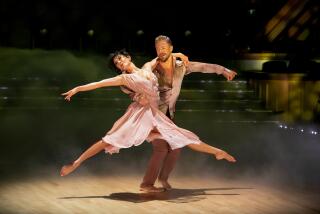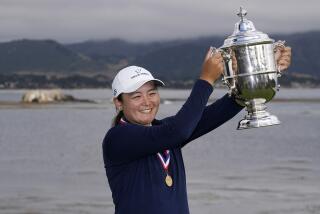Christy Erb Finds Having Fun Can Lead to Success : Golf: Rather than quit as a collegian, a change in attitude lifts her to second in the NCAA tourney.
- Share via
BONITA — Rather than script her own movie from the experience, Bonita’s Christy Erb returned to the Golf Course from Hell to try to change her history on it.
Seven months ago, the Ohio State University Invitational all but turned Erb’s world upside down. With her 71st-place performance, the UCLA senior-to-be, a 1988 USDHS graduate, contemplated early retirement.
It wasn’t that golf wasn’t enjoyable anymore. It’s just that in her first two years at UCLA, fun wasn’t so much a part of her golf vocabulary as were doubt and fear.
Then last month, Erb returned to that Ohio State course, where the NCAA women’s championships were staged. She had a healthier, happier perspective. Since her earlier visit, a lot had changed for Erb, but most importantly, golf was fun.
“There was a huge change in her this year,” said Bonita’s Elizabeth Bowman, a UCLA teammate who has known Erb for 10 years. “She’s always been a really intense, technical and swing-oriented player. That’s how she played her game. I don’t know what made her change. Maybe she came to the conclusion that you don’t have to have a perfect swing to win. The biggest difference now is that she’s having fun.”
Erb had a blast when she birdied the 18th hole of regulation and sent the Bruins into a one hole sudden-death playoff against San Jose State, which UCLA beat for its first national championship. In the individual championship, Erb was second.
As a matter of fact, this is the part where they’re having fun.
Dressed in khaki shorts and a crested maroon shirt, Erb, 20, recently sat overlooking the driving range her parents own and talked about the game that has defined, consumed and demoralized her.
Erb had reached her breaking point at that dismal tournament last fall--or so she thought.
“It was our second tournament of the season,” Erb said. “I didn’t want to be out there. It was not a good time. During the (first) round, I was thinking about what I would do with my life if it didn’t involve golf.”
Not much, she discovered. Although Erb said she came closer to chucking her clubs than anyone suspected, the picture of life without golf was bleak.
“Most of my friends are involved in golf and I was on a scholarship,” said Erb, “What was I going to do if I quit? There really wasn’t much left. That was a turning point for me.”
It was one of many such moments, but it was the one that actually turned her around.
“I realized I had been sloughing off and that I have to be more devoted if I want to make a career of (golf),” said Erb. “But I don’t want to be controlled by it.”
After an illustrious junior career--Erb’s father, Mike, estimates she won 66, or more than a third, of the 187 tournaments she played--Erb set unrealistic goals that added to the pressure her parents unknowingly applied.
“Yes, they put pressure on me, and, yes, they were upset (when I thought about quitting),” said Erb. “They were as involved with my golf as I was. They probably made some mistakes (raising me), but I don’t know anyone who had a perfect childhood.”
Said Mike Erb: “We got spoiled from junior golf, because she won so much. We got where we just expected (her to win).”
The victories never came, not until her third year of college. In November, Erb won the Golf World Invitational, a prestigious tournament at Hilton Head, S.C. It was her first title since the summer of 1988, when she won the Junior World championship here.
“It was hard my freshman year because I thought I should just go out and do great,” she said. “I didn’t come close. In junior golf, I was invincible. Then people I used to beat were starting to beat me. I got demoralized with golf.”
Erb figured she was going through a typical freshman adjustment phase . . . until her sophomore year rolled around.
“Things didn’t get any better after my first year,” said Erb, a history major. “They got worse. It really started me thinking about my future. I had to either do better at golf or improve my grades. Since golf wasn’t getting it done, I decided to improve my grades.”
Concentrating on academics while playing collegiate golf proved more difficult a task than Erb had anticipated.
“It’s demanding on your body to do both,” she said. “Working out, practicing, studying a lot. You really have to be organized. But I liked that, actually. Education has helped me a lot. I have a more open view of life and golf is just another part of it.”
And golf is a part of life where Erb demanded much of herself.
“It’s a little more difficult for her because she’s a perfectionist,” UCLA Coach Jackie Tobian-Steinmann said. “When you seek perfection and when you don’t get it, you seem to take it not so well when you fail or when you think you’ve failed.”
With Erb, that was a lot. Her father said Christy could win a tournament, then brood if she didn’t think she was hitting the ball well.
Through her own efforts, Christy has finally accepted that every shot doesn’t have a direct affect on her happiness.
“I’ve had to force myself to think differently,” she said. “I used to slam clubs around and act like you wouldn’t in normal situations. I’m trying to look at things more in terms of reality, and the reality is that you don’t hit a perfect shot all the time.”
At the height of her discontent, which Mike Erb said may have started with burnout after high school, Christy said there were some players and coaches who felt she didn’t care.
“It was a time when I didn’t want to care as much,” she said. “I just wasn’t prepared for all of this. I was afraid. I was wishy-washy.”
These days, she takes it one tournament at at time.
“I’m trying to settle down,” she said. “You do well and it brings back your confidence, then you start thinking, ‘Yeah, I can do it again.’ And the whole process begins again. It’s been difficult, like nothing I’d ever imagined or dreamed of. But it couldn’t have happened any other way.”
Intimidation from opponents. Placing blame on outside factors. Fear of failure.
These were experiences she had to go through. They were, Erb said, part of the growing process.
“She was amazing to watch this year,” Tobian-Steinmann said. “She progressed, she matured. Next year she should be a good team leader. She can set a good example.”
Mike Erb blames himself for some of his daughter’s problems. Christy Erb was part of a graduating class at USDHS that included Phil Mickelson.
“Phil stuck with one teacher,” Mike Erb said. “Christy was always switching around. That’s one of the things that’s probably my fault. She lost confidence because her swing wasn’t everything she had hoped for. It got her off-track.”
While Mickelson was busy winning back-to-back NCAA golf championships and being compared with a Jack Nicklaus of 20 years ago, Erb was struggling to be one of the four players whose scores count each round.
“Everyone on our team is a good player,” said Bowman, a junior. “No one likes to be the fifth scorer, the one thrown out. When you’re on a good team, that’s pretty good motivation to do well.”
Yet Erb’s scores were thrown out in at least parts of five of the Bruins’ 12 tournaments this year, excluding the two events she didn’t play following the nightmare at Ohio State. Her national ranking plummeted from 28th her freshman year to 55th her sophomore year to her current 54th, despite her strong showing at the national championships.
Especially exasperating were her inconsistent finishes. Along with her first and second, she once tied for 48th and there was that 71st.
“Christy has a lot of talent,” said Tobian-Steinmann. “She shows intelligence on the course. She can play by the seat of her pants and she has the ability to be real excellent. But she’s been up and down. When she’s on, she’s really on. Other times, she’s been inconsistent.”
Erb was on full throttle at nationals, where the team kidded her during practice rounds that she “came to play some golf.” She responded by shooting rounds of 71 and 70.
“A lot of it had to do with how she played there the first time,” said Bowman, an All-Pac-10 second team selection who finished second at the California Collegiates. “No one likes to think back and remember a tournament like that. She approached nationals like it wasn’t anything special. That’s why I really thought she would win it.”
Said Christy: “I kept draining them, even though I wasn’t hitting that well. And I didn’t let it bother me. That was another big breakthrough for me.”
Knowing what kind of year she was having, Mike and her mother, Sandy, didn’t expect much from her final effort of the season.
“After she won the tournament in November,” Mike Erb said, “we thought that would break her out of (her slump), but she was up and down, mainly down after that. We didn’t want to get our hopes up, but we always felt she could do well. It was a super feeling.”
It was super for her as well, although Erb isn’t an open book when it comes to showing emotion.
Erb’s response to the question, “Do you love golf?” sounds like a scene from “Fiddler on the Roof,” where a woman asks her husband if he loves her.
“Do I what? Do I love you? You’re my wife,” he answers.
Said Christy: “Do I love golf? I don’t know if I have that ‘pure love’ you hear about. My dad instilled in me the desire to be the best. That’s a part of me. I don’t think I’d be happy if I weren’t playing.”
She dismissed the notion that you must have a passion for golf to excel.
“There are so many things in the world that are more important,” she said. “That sounds ridiculous to me.”
Erb will wait until her senior year to decide whether to test the pro circuit. She won’t drive herself nuts in the process.
“If I still enjoy playing, (I’ll try it),” she said. “One deciding factor is if it doesn’t make me a wreck and if I can handle the pressure.”
Lifestyle is another consideration. The percentage of players making a comfortable living on the tour is small enough that all parties agree on the importance of a college degree.
“If that’s what she wants, fine, go out and give it a shot, but there are a lot of heartaches that go with that,” Mike Erb said. “From a selfish standpoint, you’d like to see them get into the pros, but if you’re not the top, it’s a tough lifestyle.”
Said Christy: “I’ll only do it if I can make a decent living. I don’t want to live out of a car or be a drifter. I’ll give it two years and see what happens.”
More to Read
Go beyond the scoreboard
Get the latest on L.A.'s teams in the daily Sports Report newsletter.
You may occasionally receive promotional content from the Los Angeles Times.










